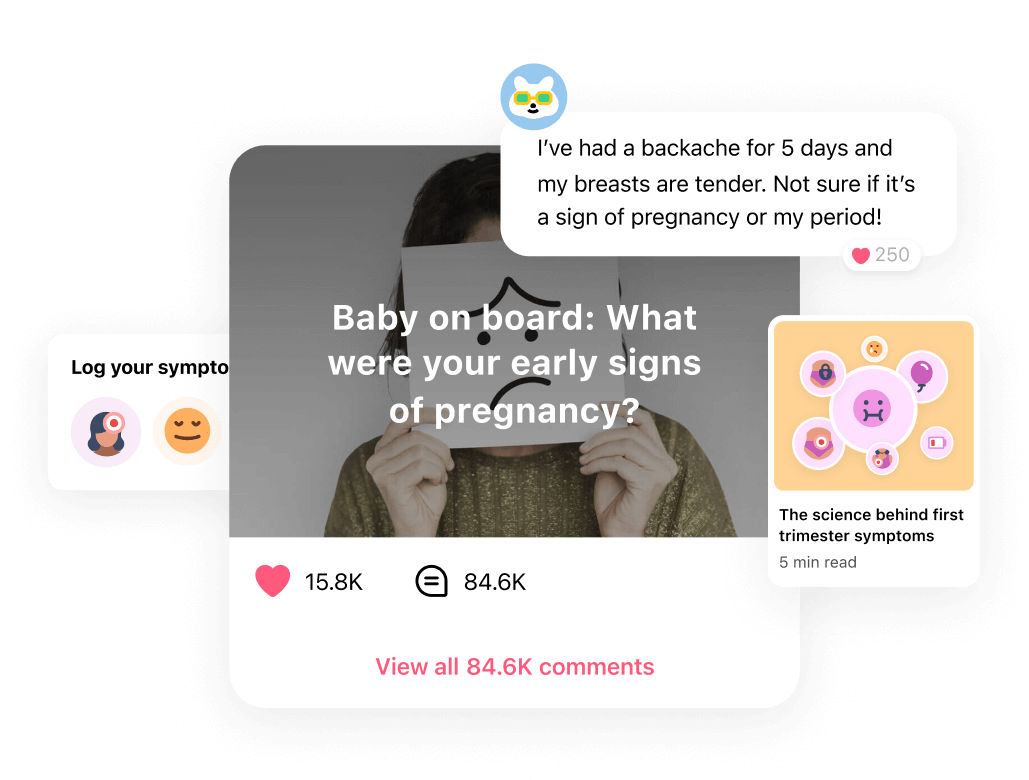Morning sickness — the nausea and vomiting that some pregnant people experience — is a common symptom of pregnancy. Affecting about 80 percent of pregnant people, morning sickness is often one of the earliest symptoms of pregnancy. Thankfully, this uncomfortable condition can be managed with some self-care tips.
-
Tracking cycle
-
Getting pregnant
-
Pregnancy
-
Help Center
-
Flo for Partners
-
Anonymous Mode
-
Flo app reviews
-
Flo Premium New
-
Secret Chats New
-
Symptom Checker New
-
Your cycle
-
Health 360°
-
Getting pregnant
-
Pregnancy
-
Being a mom
-
LGBTQ+
-
Quizzes
-
Ovulation calculator
-
hCG calculator
-
Pregnancy test calculator
-
Menstrual cycle calculator
-
Period calculator
-
Implantation calculator
-
Pregnancy weeks to months calculator
-
Pregnancy due date calculator
-
IVF and FET due date calculator
-
Due date calculator by ultrasound
-
Medical Affairs
-
Science & Research
-
Pass It On Project New
-
Privacy Portal
-
Press Center
-
Flo Accuracy
-
Careers
-
Contact Us
When Does Morning Sickness Start After Conception?


Every piece of content at Flo Health adheres to the highest editorial standards for language, style, and medical accuracy. To learn what we do to deliver the best health and lifestyle insights to you, check out our content review principles.
Despite its name, “morning” sickness can happen at any time of the day. But when does morning sickness usually start, and what are its causes and treatments? These are some of the questions we will answer today, so read on.

 Over
7.8M
ratings averaging
4.8/5
*
Over
7.8M
ratings averaging
4.8/5
*
Understand your body’s signals with the Flo app
- Chat with others who are trying to get pregnant.
- Get trusted information on signs of pregnancy from 100+ medical experts.
- Log your symptoms and learn what they could be trying to tell you.
 Over
7.8M
ratings averaging
4.8/5
*
Over
7.8M
ratings averaging
4.8/5
*

Trying to conceive?
The Flo app can help you through the two-week wait.

 Over
7.8M
ratings averaging
4.8/5
*
Over
7.8M
ratings averaging
4.8/5
*
Understand your body’s signals with the Flo app
- Chat with others who are trying to get pregnant.
- Get trusted information on signs of pregnancy from 100+ medical experts.
- Log your symptoms and learn what they could be trying to tell you.
Why people feel morning sickness
Medical researchers haven’t figured out exactly why morning sickness happens. However, the body’s reaction to the pregnancy hormone human chorionic gonadotropin (hCG) has been suggested as a possible cause. This hormone is produced after the fertilized egg attaches to the lining of the uterus.
Are morning sickness and nausea inevitable during pregnancy?
Since morning sickness affects around 80 percent of pregnant people, it may feel like an unavoidable part of pregnancy. The likelihood increases with genetic predisposition and psychological discomfort. In other words, you’re more likely to develop nausea during pregnancy if your mom experienced it or if you’re experiencing stress or anxiety.
However, some people don’t experience any symptoms of morning sickness. If you’re part of the 80 percent who does, though, some precautions and self-care tips can help manage the symptoms. Taking vitamin B6 during pregnancy can reduce the severity of morning sickness in some cases.
Take a quiz
Find out what you can do with our Health Assistant
Causes of morning sickness
The exact reasons for morning sickness are unclear, but here are a few factors that may explain why it happens:
Rising hCG levels: One of the possible reasons for morning sickness could be the body’s reaction to increasing levels of the pregnancy hormone hCG. The body begins to produce this hormone after the fertilized egg attaches to the uterine lining. Nausea and vomiting linked to morning sickness may show that your body is trying to adjust to the changing hormones.
In some cases, nausea and vomiting could signal some other medical conditions such as an ulcer, food-related issues, and thyroid or gallbladder disease. A health care provider might suspect one of these conditions if they are accompanied by symptoms such as abdominal pain or tenderness, fevers, headaches, or an enlarged thyroid gland.
Ginger root to reduce morning sickness

Say goodbye to ‘morning sickness’ and similar phrases
Discover why some of these phrases are out of date
How severe can morning sickness get?
Everyone’s pregnancy is different, and so their morning sickness varies in severity from mild to extreme. For some people, the symptoms might include mild nausea and stomach discomfort a few times a day. About 1 percent of pregnant people experience extremely severe morning sickness symptoms and are diagnosed with a condition known as hyperemesis gravidarum. People with hyperemesis gravidarum experience severe nausea, frequent vomiting, weight loss, and electrolyte imbalances.
This condition may be diagnosed when a person has lost five percent of their prepregnancy weight and has other problems related to dehydration.
Nausea and vomiting can become more problematic if a person struggles to keep down food or fluids and begins to lose weight. When this happens, the fetus’s weight at birth may be affected.
Call a health care provider if you have the following signs of dehydration:
- You have a small amount of urine that is dark in color.
- You feel dizzy or faint when standing up.
- You have a racing or pounding heartbeat.
Hospitalization is sometimes required in these cases, as some patients need a feeding tube and/or intravenous fluids to stay healthy.

How to treat morning sickness
With some self-care tips, home remedies, and natural treatments, you can reduce some aspects of morning sickness. Here are some tips to keep in mind:
- Vitamins: Taking vitamin B6 during pregnancy can reduce the severity of morning sickness. Make sure to ask your doctor for advice about the dosage.
- Ginger: Ginger can reduce the nausea caused by morning sickness. Eating or drinking gingery foods and beverages can help ease your symptoms naturally.
- Have small, frequent meals: Instead of a few heavy meals, try eating several small snacks throughout the day. This keeps your digestive system from getting overloaded, making it easier to keep food down. Simple, warm dishes such as soups can offer appropriate calories without making you feel full. Add beans and vegetables to ensure proper nutrition.
- Stay hydrated: The vomiting caused by morning sickness can dehydrate you, further aggravating symptoms. Take small sips of water throughout the day to stay hydrated — not just when you feel thirsty. Aim for 8–12 cups of water a day during pregnancy.
- Avoid spicy and rich foods: Spicy or sugary foods can upset your stomach and worsen nausea. It’s a good idea to stay away from them, as well as any food whose smell or taste makes you feel sick. Eat simple foods that can be easily digested. Here is a handy nutrition guide you can use to decide what to eat at each stage of your pregnancy.
- Pay attention to smells: Pleasant scents like lavender or mint can help manage nausea.
- Try acupressure: Studies have shown that acupressure on the inner wrist can be used as an alternative method to bring relief from nausea.
- Get emotional support: Additional anxiety and stress can aggravate discomfort. Getting support from your friends and family can help manage your concerns as well as symptoms like nausea.
When does morning sickness end?
For most people, morning sickness usually begins around weeks five or six and eases by about week 12 or 14. For about 10 percent of pregnant people, it can last until week 20. In even fewer cases, morning sickness can persist throughout the pregnancy.
Morning sickness affects around 80 percent of pregnant people and is often one of the earliest signs of pregnancy. Characterized by frequent nausea and vomiting, it starts at around week six of pregnancy and usually fades by week 12 or 14. In most cases, it can be treated with natural remedies like taking ginger, eating smaller meals, and staying hydrated. About 1 percent of pregnant people experience an extreme form of morning sickness called hyperemesis gravidarum, which may require hospitalization. If you have severe vomiting, dark-colored urine, frequent dizziness, and difficulty keeping down liquids, talk to your doctor and seek appropriate treatment.
Our Due Date Calculator can help predict the date when you're due based on the first day of your last menstrual period.
If you conceived through IVF, check out Flo’s IVF and FET Due Date Calculator.


Hey, I'm Anique
I started using Flo app to track my period and ovulation because we wanted to have a baby.


The Flo app helped me learn about my body and spot ovulation signs during our conception journey.


I vividly
remember the day
that we switched
Flo into
Pregnancy Mode — it was
such a special
moment.
Real stories, real results
Learn how the Flo app became an amazing cheerleader for us on our conception journey.
References
Dean, Erin. “Morning Sickness.” Nursing Standard (Royal College of Nursing [Great Britain]: 1987), U.S. National Library of Medicine, 10 Aug. 2016, www.ncbi.nlm.nih.gov/pubmed/27507366.
Maltepe, Caroline. “Surviving Morning Sickness Successfully: from Patient's Perception to Rational Management.” Journal of Population Therapeutics and Clinical Pharmacology = Journal De La Therapeutique Des Populations Et De La Pharmacologie Clinique, U.S. National Library of Medicine, 2014, www.ncbi.nlm.nih.gov/pubmed/25654792.
Quinla, Jeffrey D, and D Ashley Hill. “Nausea and Vomiting of Pregnancy.” American Family Physician, U.S. National Library of Medicine, 1 July 2003, www.ncbi.nlm.nih.gov/pubmed/12887118.
Festin, Mario. “Nausea and Vomiting in Early Pregnancy.” BMJ Clinical Evidence, BMJ Publishing Group, 3 June 2009, www.ncbi.nlm.nih.gov/pmc/articles/PMC2907767/.
Susan S. Lang |, and 2008 June 25. “Morning Sickness Is Pregnancy 'Wellness Insurance,' Says Cornell Professor.” Cornell Chronicle, 25 June 2008, news.cornell.edu/stories/2008/06/pregnant-women-get-morning-sickness-protect-fetus.
Sharifzadeh, Fatemeh, et al. “A Comparison between the Effects of Ginger, Pyridoxine (Vitamin B6) and Placebo for the Treatment of the First Trimester Nausea and Vomiting of Pregnancy (NVP).” The Journal of Maternal-Fetal & Neonatal Medicine: the Official Journal of the European Association of Perinatal Medicine, the Federation of Asia and Oceania Perinatal Societies, the International Society of Perinatal Obstetricians, U.S. National Library of Medicine, Oct. 2018, www.ncbi.nlm.nih.gov/pubmed/28629250.
Norheim, A J, et al. “Acupressure Treatment of Morning Sickness in Pregnancy. A Randomised, Double-Blind, Placebo-Controlled Study.” Scandinavian Journal of Primary Health Care, U.S. National Library of Medicine, Mar. 2001, www.ncbi.nlm.nih.gov/pubmed/11303547.
“Morning Sickness.” Mayo Clinic, Mayo Foundation for Medical Education and Research, 22 Sept. 2018, www.mayoclinic.org/diseases-conditions/morning-sickness/symptoms-causes/syc-20375254.
“Drugs, Ginger and Acupuncture 'Best for Morning Sickness'.” NHS Choices, NHS, 22 June 2016, www.nhs.uk/news/pregnancy-and-child/drugs-ginger-and-acupuncture-best-for-morning-sickness/.
Shrim, A, et al. “Pregnancy Outcome Following Use of Large Doses of Vitamin B6 in the First Trimester.” Journal of Obstetrics and Gynaecology : the Journal of the Institute of Obstetrics and Gynaecology, U.S. National Library of Medicine, Nov. 2006, www.ncbi.nlm.nih.gov/pubmed/17130022.
“Morning Sickness: Nausea and Vomiting of Pregnancy.” ACOG, 2020, www.acog.org/womens-health/faqs/morning-sickness-nausea-and-vomiting-of-pregnancy.
History of updates
Current version (09 January 2023)
Published (12 February 2019)
In this article

Get your personal guide to fertility
-
Learn how to read your body's ovulation signals
-
Find daily conception tips from our experts
-
Chat with others who are trying to get pregnant




